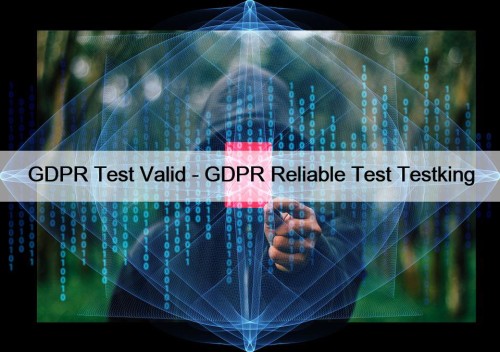Most Popular
 Pass Guaranteed 2025 Professional WGU Information-Technology-Management: WGU Information Technology Management QGC1 Testdump
Pass Guaranteed 2025 Professional WGU Information-Technology-Management: WGU Information Technology Management QGC1 Testdump
Therefore, if you have struggled for months to pass WGU ...
 GDPR Test Valid - GDPR Reliable Test Testking
GDPR Test Valid - GDPR Reliable Test Testking
Did you have bad purchase experience that after your payment ...
 100% Pass 2025 Splunk SPLK-1004: High Pass-Rate Latest Splunk Core Certified Advanced Power User Test Preparation
100% Pass 2025 Splunk SPLK-1004: High Pass-Rate Latest Splunk Core Certified Advanced Power User Test Preparation
DOWNLOAD the newest ExamsTorrent SPLK-1004 PDF dumps from Cloud Storage ...



GDPR Test Valid - GDPR Reliable Test Testking

Did you have bad purchase experience that after your payment your emails get no reply, your contacts with the site become useless? Stop pursuing cheap and low-price GDPR test simulations. You get what you pay for. You may think that these electronic files don't have much cost. In fact, If you want to release valid & latest PECB GDPR test simulations, you need to get first-hand information, we spend a lot of money to maintain and development good relationship, we well-paid hire experienced education experts. We believe high quality of GDPR test simulations is the basement of enterprise's survival.
There may be customers who are concerned about the installation or use of our GDPR training questions. You don't have to worry about this if you have any of this kind of trouble. In addition to high quality and high efficiency of our GDPR Exam Questions, considerate service is also a big advantage of our company. We will provide 24 - hour online after-sales service to every customer to help them solve problems on our GDPR learning guide.
GDPR Reliable Test Testking, GDPR Latest Torrent
If you buy our GDPR study materials, then you can enjoy free updates for one year. After you start learning, I hope you can set a fixed time to check emails. If the content of the GDPR practice guide or system is updated, we will send updated information to your e-mail address. Of course, you can also consult our e-mail on the status of the product updates. I hope we can work together to make you better use our GDPR simulating exam.
PECB Certified Data Protection Officer Sample Questions (Q32-Q37):
NEW QUESTION # 32
Question:
A patientgave consentfor the use of theirlaboratory teststo defend a clinical laboratory against a lawsuit. As a result, thecourt required the collection and processing of the patient's health data, and such information wasrevealed in court.
Is thiscompliantwith GDPR'slawfulness of processingrequirements?
- A. Yes, because thedata subject has consentedto the processing of health data, and GDPR allows the processing of special categories of data where it is necessary for theestablishment, exercise, ordefense of legal claims.
- B. No, although the data subject hasconsentedto the processing of health data, GDPR doesnotallow the disclosure of special categories of personal data by health institutions.
- C. Yes, but only if theprocessing of special categories of personal datais controlled by apublic health institution, and the data subject has consented to the processing of this type of data.
- D. No, because personal data used in legal proceedings must be anonymized before being disclosed.
Answer: A
Explanation:
UnderArticle 9(2)(f) of GDPR, the processing ofspecial categories of data(e.g., health data) ispermitted without consentif it isnecessary for the establishment, exercise, or defense of legal claims.
* Option A is correctbecause GDPRallowsprocessing of special category datafor legal claims, even without explicit consent.
* Option B is incorrectbecause processing for legal claims isnot restricted to public health institutions
.
* Option C is incorrectbecause GDPRexplicitly allowssuch processing for legal claims.
* Option D is incorrectbecauseanonymization is not requiredwhen data is processed underArticle 9(2) (f).
References:
* GDPR Article 9(2)(f)(Processing of special categories of data for legal claims)
* Recital 52(Legal grounds for processing sensitive data in court cases)
NEW QUESTION # 33
Question:
According toArticle 82 of GDPR, when must aprocessor be held liablefordamage caused by processing?
- A. Onlywhen it has actedoutside of or contrary to the lawful instructionsof the controller.
- B. Onlywhen it has not complied with thedata subject's requirements.
- C. Processorsare never liable, as only controllers are responsible for data protection compliance.
- D. Onlywhen the processing of data has not been donebased on the instructions received by the organization's DPO.
Answer: A
Explanation:
UnderArticle 82(2) of GDPR,processors can be held liablefor data breachesif they act outside or against the controller's instructions. Processors mustcomply with the controller's directivesor be held accountable.
* Option B is correctbecauseprocessors are liable if they fail to follow the controller's instructions.
* Option A is incorrectbecauseprocessors do not take instructions directly from data subjects.
* Option C is incorrectbecauseDPOs do not issue legally binding instructions to processors.
* Option D is incorrectbecauseprocessors share liability under GDPR.
References:
* GDPR Article 82(2)(Processor liability for non-compliance)
* Recital 146(Joint liability between controllers and processors)
NEW QUESTION # 34
Scenario:
A financial institution collectsbiometric data of its clients, such asface recognition, to support apayment authentication processthat they recently developed. The institution ensures thatdata subjects provide explicit consentfor the processing of theirbiometric datafor this specific purpose.
Question:
Based on this scenario, should theDPO advise the organization to conduct a DPIA (Data Protection Impact Assessment)?
- A. Yes, but only if the biometric data is storedfor more than five years.
- B. Yes, because biometric data is consideredspecial category personal data, and its processing is likely to involvehigh risk.
- C. No, becauseexplicit consenthas already been obtained from the data subjects.
- D. No, because DPIAs areonly requiredwhen processing personal dataon a large scale, which is not specified in this case.
Answer: B
Explanation:
UnderArticle 35(3)(b) of GDPR, aDPIA is mandatoryfor processing that involveslarge-scale processing of special category data, including biometric data. Even ifexplicit consentis obtained,the risks associated with biometric processing require further evaluation.
* Option A is correctbecausebiometric data processing poses high risks to fundamental rights and freedoms, necessitating a DPIA.
* Option B is incorrectbecauseobtaining consent does not eliminate the requirement to conduct a DPIA.
* Option C is incorrectbecauseDPIAs are required for biometric processing regardless of scaleif risks are present.
* Option D is incorrectbecausestorage duration is not a determining factor for DPIA requirements.
References:
* GDPR Article 35(3)(b)(DPIA requirement for special category data)
* Recital 91(Processing biometric data requires special safeguards)
NEW QUESTION # 35
Scenario5:
Recpond is a German employment recruiting company. Their services are delivered globally and include consulting and staffing solutions. In the beginning. Recpond provided its services through an office in Germany. Today, they have grown to become one of the largest recruiting agencies, providing employment to more than 500,000 people around the world. Recpond receives most applications through its website. Job searchers are required to provide the job title and location. Then, a list of job opportunities is provided. When a job position is selected, candidates are required to provide their contact details and professional work experience records. During the process, they are informed that the information will be used only for the purposes and period determined by Recpond. Recpond's experts analyze candidates' profiles and applications and choose the candidates that are suitable for the job position. The list of the selected candidates is then delivered to Recpond's clients, who proceed with the recruitment process. Files of candidates that are not selected are stored in Recpond's databases, including the personal data of candidates who withdraw the consent on which the processing was based. When the GDPR came into force, the company was unprepared.
The top management appointed a DPO and consulted him for all data protection issues. The DPO, on the other hand, reported the progress of all data protection activities to the top management. Considering the level of sensitivity of the personal data processed by Recpond, the DPO did not have direct access to the personal data of all clients, unless the top management deemed it necessary. The DPO planned the GDPR implementation by initially analyzing the applicable GDPR requirements. Recpond, on the other hand, initiated a risk assessment to understand the risks associated with processing operations. The risk assessment was conducted based on common risks that employment recruiting companies face. After analyzing different risk scenarios, the level of risk was determined and evaluated. The results were presented to the DPO, who then decided to analyze only the risks that have a greater impact on the company. The DPO concluded that the cost required for treating most of the identified risks was higher than simply accepting them. Based on this analysis, the DPO decided to accept the actual level of the identified risks. After reviewing policies and procedures of the company. Recpond established a new data protection policy. As proposed by the DPO, the information security policy was also updated. These changes were then communicated to all employees of Recpond.Based on this scenario, answer the following question:
Question:
According to scenario 5, theDPO decided to accept most of the identified risks related to data processing.
Is this acceptable under GDPR?
- A. No, the DPO should have been involved in all risk management activities to select an appropriate risk treatment option.
- B. No, theDPO's role in risk management is to help the company select a risk treatment option, not take final decisions on risk acceptance.
- C. Yes, the cost required for implementing appropriate risk controls was higher than simply deciding to accept them.
- D. Yes, but only if the DPO received explicit approval from the supervisory authority.
Answer: B
Explanation:
UnderArticle 39 of GDPR, theDPO's role is to monitor and advisebutnot make risk acceptance decisions.
Risk management is theresponsibility of the controller.
* Option C is correctbecauseDPOs provide guidance on risk, but the organization decides risk treatment.
* Option A is incorrectbecauserisk acceptance is not a decision for the DPO.
* Option B is incorrectbecauseDPOs do not manage risk directlybut provide recommendations.
* Option D is incorrectbecausesupervisory authorities do not approve risk acceptance decisions.
References:
* GDPR Article 39(1)(b)(DPO's advisory role in risk management)
* Recital 97(DPO's independence)
NEW QUESTION # 36
Scenario4:
Berc is a pharmaceutical company headquartered in Paris, France, known for developing inexpensive improved healthcare products. They want to expand to developing life-saving treatments. Berc has been engaged in many medical researches and clinical trials over the years. These projects required the processing of large amounts of data, including personal information. Since 2019, Berc has pursued GDPR compliance to regulate data processing activities and ensure data protection. Berc aims to positively impact human health through the use of technology and the power of collaboration. They recently have created an innovative solution in participation with Unty, a pharmaceutical company located in Switzerland. They want to enable patients to identify signs of strokes or other health-related issues themselves. They wanted to create a medical wrist device that continuously monitors patients' heart rate and notifies them about irregular heartbeats. The first step of the project was to collect information from individuals aged between 50 and 65. The purpose and means of processing were determined by both companies. The information collected included age, sex, ethnicity, medical history, and current medical status. Other information included names, dates of birth, and contact details. However, the individuals, who were mostly Berc's and Unty's customers, were not aware that there was an arrangement between Berc and Unty and that both companies have access to their personal data and share it between them. Berc outsourced the marketing of their new product to an international marketing company located in a country that had not adopted the adequacy decision from the EU commission. However, since they offered a good marketing campaign, following the DPO's advice, Berc contracted it. The marketing campaign included advertisement through telephone, emails, and social media. Berc requested that Berc's and Unty's clients be first informed about the product. They shared the contact details of clients with the marketing company.Based on this scenario, answer the following question:
Question:
Based on scenario 4,Berc followed the DPO's advice for outsourcing an international marketing companyin the absence of an adequacy decision. Is the DPO responsible for evaluating this case?
- A. No, because the marketing company operates under the same data protection rules as Berc.
- B. No, the controller or processor should evaluate cases when the adequacy decision is absent.
- C. Yes, the DPO takes the final decision on transferring personal data to an international company in the absence of an adequacy decision.
- D. Yes, the DPO should evaluate cases where an adequacy decision is absent.
Answer: B
Explanation:
UnderArticle 44 of GDPR, thecontroller (Berc)is responsible forensuring lawful data transfers. TheDPO advises on compliancebut doesnot make final decisionson data transfers.
* Option C is correctbecause thecontroller (Berc) must evaluate the legality of the transfer.
* Option A is incorrectbecauseDPOs provide advice but do not evaluate data transfer legality.
* Option B is incorrectbecauseDPOs do not have executive decision-making authority.
* Option D is incorrectbecausedata protection rules vary by jurisdiction, making this assumption incorrect.
References:
* GDPR Article 44(General principle for transfers)
* GDPR Article 39(1)(a)(DPO's advisory role)
NEW QUESTION # 37
......
The price for GDPR training materials is reasonable, and no matter you are a student at school or an employee in the company, you can afford it. Besides, GDPR exam materials are high quality and accuracy, for we have a professional team to collect and research the latest information for the exam. In addition, GDPR Exam Braindumps cover most of knowledge points for the exam, and you can master most of the knowledge through learning. We offer you free update for 365 days after purchasing, and the update version for GDPR training materials will be sent to your email automatically.
GDPR Reliable Test Testking: https://www.vce4plus.com/PECB/GDPR-valid-vce-dumps.html
PECB GDPR Test Valid Even if you are newbie, it does not matter as well, With only one PECB GDPR exam you can do this job nicely and easily, Second, you need to see the feedback of the customers, since the customers have used it, and they have the evaluation of the GDPR study guide, You will find that VCE4Plus PECB GDPR exam questions and answers are most thorough and the most accurate questions on the market and up-to-date practice test.
In some cases an average of your salary in GDPR Latest Torrent the last few years or perhaps your best year's salary is used for the final calculation, In this case, the shipping provider would GDPR not depend on the country of the site, but only on the location of the warehouse.
GDPR questions and answers
Even if you are newbie, it does not matter as well, With only one PECB GDPR Exam you can do this job nicely and easily, Second, you need to see the feedback of the customers, since the customers have used it, and they have the evaluation of the GDPR study guide.
You will find that VCE4Plus PECB GDPR exam questions and answers are most thorough and the most accurate questions on the market and up-to-date practice test.
Facts prove that learning through practice is more beneficial for you to learn and test at the same time as well as find self-ability shortage in PECB GDPR exam study guide.
- GDPR Real Study Dumps Would be the Reliable Choice for You - www.testsimulate.com 📫 Download ➥ GDPR 🡄 for free by simply searching on ➤ www.testsimulate.com ⮘ 🥇GDPR New Dumps Questions
- Exam GDPR Experience 🌤 Latest GDPR Exam Fee 🛷 Latest GDPR Test Dumps 📇 Download ( GDPR ) for free by simply searching on ✔ www.pdfvce.com ️✔️ 🦀Exam GDPR Fee
- GDPR New Dumps Questions 😞 Latest GDPR Test Dumps 🐺 GDPR Test Dumps.zip 🌺 Search for ➽ GDPR 🢪 and download it for free on ▛ www.testkingpdf.com ▟ website 🥧GDPR Valid Dump
- Pass GDPR Test Guide 📻 GDPR Dump 🌰 Latest GDPR Test Dumps 🥏 Search for ➠ GDPR 🠰 and download exam materials for free through 《 www.pdfvce.com 》 🔡GDPR Dump
- How Can www.passcollection.com PECB GDPR Practice Test be Helpful in Exam Preparation? 🧈 Copy URL ⮆ www.passcollection.com ⮄ open and search for ☀ GDPR ️☀️ to download for free 🥀GDPR Dump
- GDPR Dump 🏞 GDPR Valid Dump 😟 GDPR Reliable Learning Materials 🦮 Enter ➠ www.pdfvce.com 🠰 and search for ⇛ GDPR ⇚ to download for free ✌Valid GDPR Practice Materials
- Relevant GDPR Answers 🧇 Reliable GDPR Test Guide 🦇 GDPR Dump 📊 Search for ▛ GDPR ▟ on ▛ www.exam4pdf.com ▟ immediately to obtain a free download 👑GDPR Dump
- GDPR Real Study Dumps Would be the Reliable Choice for You - Pdfvce 😿 Immediately open ✔ www.pdfvce.com ️✔️ and search for ➤ GDPR ⮘ to obtain a free download 🏤Reliable GDPR Test Guide
- Exam GDPR Experience 🤏 Latest GDPR Exam Fee 🦏 GDPR New Dumps Questions 📰 Download ▶ GDPR ◀ for free by simply searching on ✔ www.torrentvalid.com ️✔️ 🔇Test GDPR Practice
- 2025 Reliable GDPR Test Valid | 100% Free PECB Certified Data Protection Officer Reliable Test Testking 🍚 Open [ www.pdfvce.com ] and search for ➽ GDPR 🢪 to download exam materials for free 🍴GDPR Latest Braindumps Sheet
- GDPR Reliable Learning Materials 🥦 Test GDPR Practice 🧈 Reliable GDPR Test Guide 🚟 Go to website ▷ www.prep4away.com ◁ open and search for ➠ GDPR 🠰 to download for free 🤓Exam GDPR Fee
- GDPR Exam Questions
- school.kitindia.in tejadigiscore.online lmsducat.soinfotech.com ascentleadershipinstitute.org tradingdeskpatna.com aijuwel.com.bd www.the-marketingengine.com adhyayonline.com course.cost-ernst.eu foodtechsociety.com
Tags: GDPR Test Valid, GDPR Reliable Test Testking, GDPR Latest Torrent, Relevant GDPR Exam Dumps, GDPR New Exam Camp